#deng xiaoping
Text
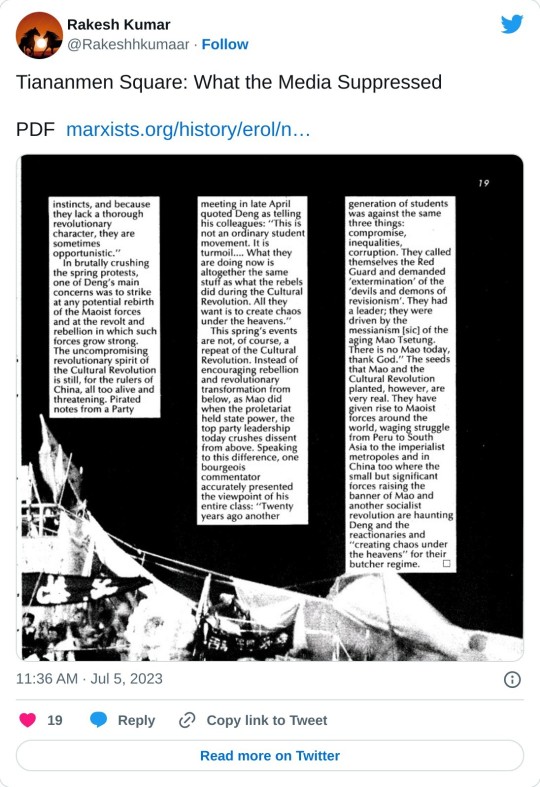
Tiananmen Square: What The Media Suppressed - Published in A World To Win Magazine, Issue 14, 1989
Mao Tsetung's cadres were clean,
The Gang of Four's cadres were brave,
Hua Guofeng's cadres were nowhere to be seen, Deng Xiaoping's cadres are all millionaires.
- Poem from Tiananmen Square, Spring 1989
#China#Mao#Maoism#MLM#marxism#marxism leninism maoism#tiananmen square#tiananmen massacre#PRC#Deng#deng xiaoping#Mao Zedong#gang of four#Hua Guofeng#capitalism#imperialism#communism#revolutionary#revolution#socialism#maoist#communist
29 notes
·
View notes
Text
The ugly truth that the West doesn't want you to see is that an armoured column of the PLA during an active color revolution is more professional and more interested in the citizens life than the average westerner police officer
The post is machine translated
Translation Is at the bottom
The collective is on telegram
⚠️ EH, MA "IL CARROOOO!11!1!!!1!" - LA VERITÀ SU QUELL'EVENTO E IL VIDEO COMPLETO ⚠️
😂 Veniamo ora, al "classico" video re-postato ogni anno dalle più becere figure anti-Cinesi, dai liberali d'Occidente ai più ferventi reazionari anti-Cinesi ascrivibili ad una certa porzione della galassia "anti-Sistema", quello del "Tank Man" 🤦♀️
🤡 Solitamente, Media Occidentali & Co mostrano video di pochi secondi, creando - con un perverso meccanismo psicologico - la domanda: "che gli sarà successo? L'avranno schiacciato? Chissà che fine ha fatto..." 🤦♂️
🤔 Ebbene, guardando l'intero video si può notare che:
一 I carri armati si sono FERMATI, e hanno persino lasciato che l'uomo salisse sul carro ❗️
二 I soldati hanno lasciato l'uomo andarsene via ILLESO, e non vi sono praticamente foto / video di soldati che sparano alle persone (come fa notare World Affairs non significa che non sia successo, ma è un punto da tenere a mente) ❗️
三 I carri non stavano andando VERSO la Piazza, stavano tornando INDIETRO ❗️
😡 La propaganda Occidentale, come scrive World Affairs, ha esagerato gli eventi, omesso la realtà e non ha mostrati immagini di carri armati e veicoli militari bruciati dai manifestanti "pacifici" 😡
🐰 Poco male, ve li mostra il Collettivo Shaoshan nei prossimi post! 🌺
🌸 Iscriviti 👉 @collettivoshaoshan
⚠️ EH, BUT "THE TAAAAAANK!11!1!!!1!" - THE TRUTH ABOUT THAT EVENT AND THE FULL VIDEO ⚠️
😂 Now we come to the "classic" video re-posted every year by the most vulgar anti-Chinese figures, from Western liberals to the most fervent anti-Chinese reactionaries attributable to a certain portion of the "anti-System" galaxy, that of the " Tank Man" 🤦♀️
🤡 Usually, Western Media & Co show videos lasting a few seconds, creating - with a perverse psychological mechanism - the question: "What happened to him? Did they crush him? Who knows what happened to him..." 🤦
🤔 Well, watching the entire video you can see that:
一 The tanks STOPPED, and even let the man get on the tank ❗️
二 The soldiers let the man walk away unhurt, and there are virtually no photos/videos of soldiers shooting people (as World Affairs points out doesn't mean it didn't happen, but it's a point to keep in mind) ❗️
三 The tanks weren't going TOWARDS the Square, they were going BACK ❗️
😡 Western propaganda, as World Affairs writes, exaggerated the events, omitted reality and did not show images of tanks and military vehicles burned by "peaceful" protesters 😡
🐰 Not bad, the Shaoshan Collective will show you in the next posts! 🌺
🌸 Subscribe 👉 @collettivoshaoshan
#socialism#china#italian#translated#communism#china news#collettivoshaoshan#marxism leninism#xi jinping#marxist leninist#marxismo#marxist#marxism#chinese history#asian history#world history#history#tiananmen square#deng xiaoping#chinese communist party#people liberation army#american imperialism#western imperialism#world affairs#free press#color revolution
27 notes
·
View notes
Text
Profile of Xi Jinping

Due to the Cultural Revolution, it is the final educational background of graduating from elementary school. It seems that he later learned organic chemistry through connections, but he must be full of resentment against the world.
Philosophically, he worships the heretic Han Fei, who applies laws harshly that never became a central Chinese ideology.
His political achievements are few and far between, eating up the legacy of Deng Xiaoping, who built China's current prosperity. That is why Xi Jinping wants to deny Deng Xiaoping.
Such a man is related to the lineage of the traditional Chinese ``court politician'', and it is normal for him to have a strong desire to show off. All Chinese dynasties have fallen under such politicians.
Even more so, this Don Quixote is said to be aiming for his own deification. It will be interesting to see how modern communist China will perish.
Rei Morishita
習近平のプロフィール
文化大革命が原因で、小学校卒業の最終学歴である。あとでコネにより有機化学を学んだらしいが、世の中に対するルサンチマンに満ちているだろう。
思想的には、中国の中心思想には決してならなかった、法を過酷に適用する、異端の韓非子を崇拝している。
政治的な功績には目立ったものはほとんどなく、現在の中国の隆盛を築いた鄧小平の遺産を食いつぶしている。だから鄧小平を否定したがる。
このような男は、中国伝統の「宮廷政治家」の系譜につながるものであり、自己顕示欲が強いのが普通である。このような政治家のもとで、ことごとく中国の王朝は滅びている。
ましてや、このドン・キホーテ、自分の神格化さえ目指しているという。さあ、どのような過程で、現代共産中国が滅びるか、見ものである。
#Xi Jinping#Cultural Revolution#rei morishita#elementary school#resentment#Han Fei#Deng Xiaoping#court politician#Don Quixote#see how modern communist China will perish.
7 notes
·
View notes
Text

#002: CRITIQUE - The New China Playbook by Keyu Jin
This is a really difficult book for me to evaluate. On the one hand, Keyu Jin deftly provides a broad overview of the reforms brought about under the leadership of Deng Xiaoping, the socioeconomic impact of these reforms, and the economic machinations of state-owned enterprises (SOEs), privately owned domestic companies, and foreign capital. I learned a lot about the history of modern China from this book, and I particularly found the passages describing the problems of education in China, the repercussions of the One Child Policy and competition between SOEs and private firms fascinating.
However, my main problem with this book lies in its framing of the contradiction between socialism and capitalism in China. The subtitle suggests this “third road” between these two economic modes of production without really defining that system. She basically argues that China is a social democratic country without using those terms, i.e. capitalist but giving a bigger slice of the pie to the working class. She also doesn’t explain Marxist economic theory very well on the very few occasions she chooses to engage with it. Chapter 2 is a particular example of this where she equates total factor productivity (TFP) with an answer to Marx’s theory of surplus value.
Politeconomy is not my strong suit, so bear with me here, but it seems as though Jin is making an argument against the Marx's theory of the tendency of the rate of profit to fall. She doesn't really explain Marx's theory beyond claiming that Marx identified the cause of this phenomenon as mere "capitalist greed". Marx argued that technological innovation enabled more efficient means of production In the short run, physical productivity would increase as a result, allowing the early adopting capitalists to produce greater use values (i.e., physical output). In the long run, if demand remains the same and the more productive methods are adopted across the entire economy, the amount of labor required (as a ratio to capital, i.e. the organic composition of capital) would decrease. Now, assuming value is tied to the amount of labor necessary, the value of the physical output would decrease relative to the value of production capital invested. In response, the average rate of industrial profit would therefore tend to decline in the longer term. It declined in the long run, Marx argued, paradoxically not because productivity decreased, but instead because it increased, with the aid of a bigger investment in equipment and materials.
TFP theory argues that an increase in the means of production, particularly improved technology, tools, machinery, etc, creates an increase to the production of outputs, i.e. creating more commodities and/or at a higher quality.
Now if I'm missing something, let me know in the comments, but it seems to me that Jin is making an argument that technology enhances the productive forces, which therefore increases productive output. It may be obvious to some that Marx has basically made the same argument in his TRPF theory. But the glaring error--or obfuscation--that stands out to me is the unwillingness or inability to address the profitability of these outputs. This, of course, stems from a failure to address where the value of a commodity comes from, which is human labor power. Even in her own chart in Chapter 2, Jin demonstrates that an increase in TFP can only temporarily prevent an economy from stagnating. Because the value of a commodity decreases with the amount of human labor power, profitability of the capitalist mode of production is not guaranteed forever. The more humans are replaced by machines, the less valuable and usually cheaper--and therefore less profitable--commodities become.
My favorite example of this concept is with using guitars. The factory-produced Yamaha guitar may sell in stores for, say, $200. It's got cheap paint, a plastic nut, a bolt-on neck and body made of low-quality wood. But the custom shop guitar, made with rare, high-quality wood cut from a single block, a bone nut, mother-of-pearl inlays on the fretboard hand-shaped into a set of flowering vines that stretch across 24 jumbo frets; now that might run you, say, $5,000. The human labor power put into the cheap Yamaha as opposed to the custom shop guitar, along with the different quality materials, are what determine the value of these commodities, which ultimately influence their varying prices.
But to her credit, I think she does paint an accurate picture of multiple mechanisms of democratic input from the people within China, both through official and unofficial channels. Her critiques of the government and the party are often fair, and she does not make the case for “regime change”, but rather for the next generation to take ownership of their country--to which I would ask: are you referring to "China's growing middle class"? Or are you referring to the brave entrepreneurs who sold rationed goods and were later allowed to be millionaires under Deng Xiaoping?
She does not paint China as an imperialist aggressor on the world stage, and highlights the willingness of the government to engage in more equitable loans to African, Asian, and South American countries than the US or the US-dominated IMF. She has a fair view of the Belt & Road Initiative. She is correct to point out that BRI is not a charity project, but it is an opportunity for countries to make crucial investments in their people and economies. And she makes it explicitly clear that, if an armed conflict were to break out between China and the US, China would not be the aggressor in such a conflict, contrary to most Western media outlets.
But this view, charitable as it may be, cannot be holistic when considering other aspect of Deng's China, namely his foreign policy.
The book focuses a lot on China's place on the world stage as of the past few decades, but doesn't even gloss over the Deng administration's open collaboration with the United States to fund and arm the Khmer Rouge as they waged a genocidal war with newly liberated Vietnam. As fascinating as it was to learn about the post-Mao reforms in China, it would have been equally revealing to learn more about the negative impacts of Dengism both nationally and internationally.
Ultimately the author seems to believe that the Chinese people lived under absolute squalor from the end of the civil war in 1949 to the beginning of the “opening up” period of 1978 brought about by Deng Xiaoping, but she fails to mention the massive improvements in the quality of life for hundreds of millions of Chinese people that were brought about post ‘49, including a massive increase in literacy rates and lifespan, which she herself acknowledges at the end of the book are crucial factors for measuring the economic success of a country.
TL;DR—I think the intention behind this book is genuine in providing a window into Chinese economic life and making the case that the Chinese should determine their own destiny. But that window is about a hundred stories above the ground floor. What I find ingenuine about the book is it’s clearly bourgeois class perspective masked in its portrayal of socialism with Chinese characteristics as a benevolent and “flexible” capitalism, i.e. social democracy/democratic socialism, whatever you want to call it. This becomes clear especially when considering the books frequent forays into Great Man Theory through praises of Deng Xiaoping and his economic reforms and the author's refusal to offer a good faith engagement with Marx's critique of political economy.
Other books I recommend on this subject include:
Fanshen: A Documentary of Revolution in a Chinese Villiage by William Hinton
China’s Economic Dialectic: The Original Aspiration of Reform by Cheng Enfu
The East is Still Red: Chinese Socialism in the 21st Century by Carlos Martinez
And finally I recommend folks read the books/articles of Mao Zedong, Deng Xiaoping, and Xi Jinping and form their own opinions on Chinese economic theory.
October 29th, 2023
#book review#bookblr#books#reading#redmuse#china#politics#socialism#communism#marxism#marxism leninism#xi jinping#deng xiaoping#keyu jin#economy#political economy#chinese culture#Chinese history#history
2 notes
·
View notes
Video
youtube
Tiananmen Square: Rarely seen video of the 1989 protests in China, December 5, 2022
In 1989, protests by students in Tiananmen Square changed the course of history — resulting in a massacre the Chinese government still denies today. Watch CNN’s coverage from on the ground that year. After the Chinese government pulled the plug on the broadcast, CNN reported by telephone and used video travelers snuck out of the country.
CNN
#Beijing#China#people's republic of china#tiananmen square#1980s#20th century#六四事件#天安門#八九六四#八九民運#天安門事件#Tiananmen Square massacre#Deng Xiaoping#Hu Yaobang#Zhao Ziyang#authoritarianism#Li Peng#people's liberation army#protest#CNN#censorship#military#politics#history#economics#democracy#human rights#erasure#progressivism#1989 Tiananmen Square protests
16 notes
·
View notes
Text
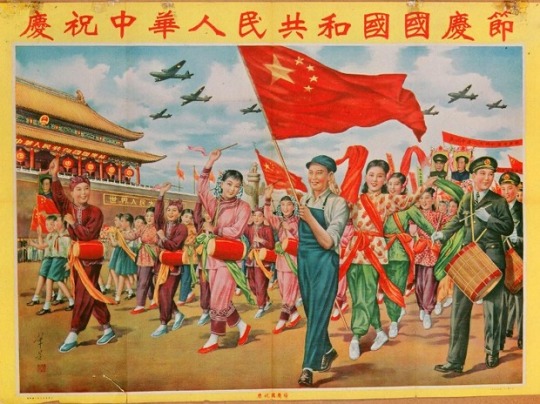
#china#beijing#communism#socialism#Marxism#Asia#deng xiaoping#xi jinping#mao zedong#cpc#little red book
2 notes
·
View notes
Text
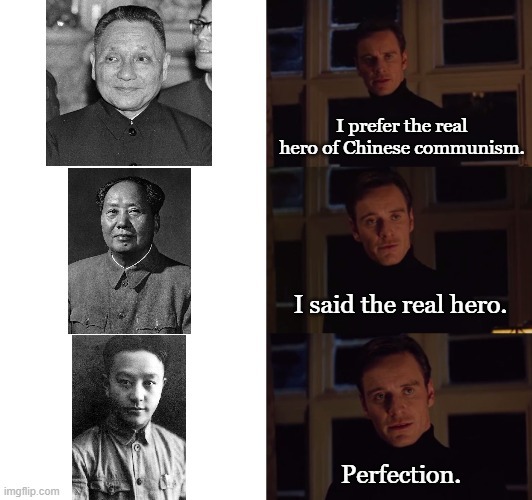
2 notes
·
View notes
Note
This is going to sound like a joke question but I’m completely serious. Who is your favourite dictator? I’m not asking you to justify their actions but what dictator do you think was the best at governing their country?
Oh, for a second I thought you meant favorite as most entertaining, because Gadhafi was certifiably crazy, but Ne Win changed the entire currency to base 9 because it was his lucky number.
If I had to pick one that really developed his country, I'd say Deng Xiaoping, because he undid a lot of Mao's damage and helped bring about economic prosperity to China - normalizing relationships with the world and laying the groundwork to subvert global institutions for China's benefit.
Thanks for the question, Anon.
SomethingLikeALawyer, Hand of the King
15 notes
·
View notes
Text
vaush is having a meltdown over this post lol
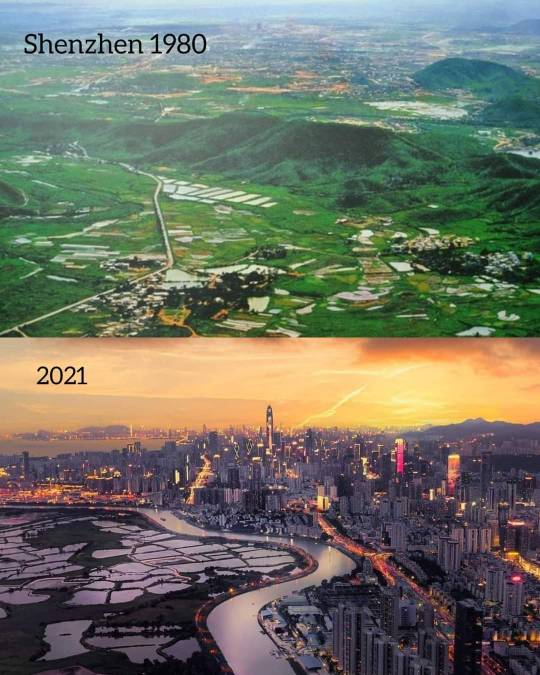
#shenzen#communism#socialism#leftism#anti capitalism#class consciousness#class conflict#capitalism#communist party of china#xi jinping#china#deng xiaoping#maoism#mao zedong#anti vaush#vaush
12 notes
·
View notes
Text
Another Day Wasted - SoundCloud
Ouça Another Day Wasted de dengxiaoping no #SoundCloud
#deng xiaoping#eletronic#experimental music#sewerslvt#drum and bass#audio#SoundCloud#communist music#communism
3 notes
·
View notes
Photo



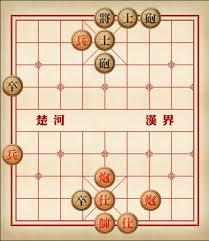
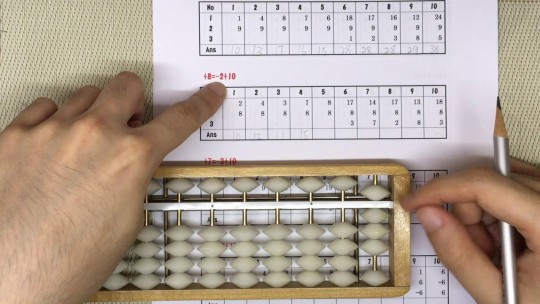




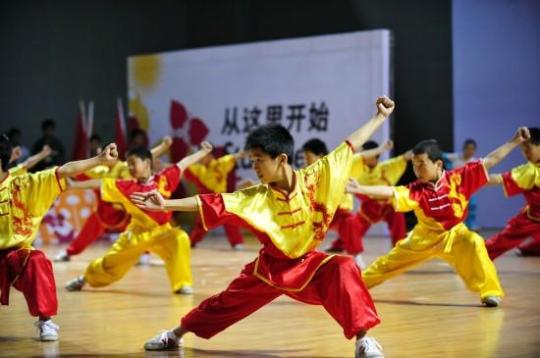
Apart From GDP As The Benchmark Of Success, China Is Bringing On Board A Number Of Fundamental Cultural & Education Reforms To Invest In The Next Generation
What are the impacts of globalization? Among others, globalization becomes evidently the process by which regional cultural influences affect one another. Different cultures result in being either more alike or increasingly tensional.
Asians believe that good relationship with a society comes from the respect of and obedience to leaders. Westerners contend that peaceful co-existence is conditional upon the compromise of the free wills and self-determinations of all individuals. The former stress that the young are to be enjoined and mistakes are to be avoided. The latter coach that life is a battle between a good and a bad wolf and we must learn to fight, with ourselves or others.
Countries nowadays still speak a totally different language: collectivism versus individualism, utilitarianism versus libertarianism, socialism versus capitalism, spirituality versus materialism, paternalistic versus emancipatory government; and muscular versus feminine society.
A wise person should not simply accept or reject. We must allow the occurrence of something that we may dislike or doubt; and patiently wait until the outcome proves the truth. What ways can produce a stronger country and happier people? Some countries tend to interfere other nations, for an ulterior purpose.
During the past 200 years, China, the 'Sleeping Dragon', went through too many sufferings: colonialism in Ching Dynasty, division by warlords(軍閥割據), Second World War, civil war and Cultural Revolution. In 1978, leader Deng Xiaoping(鄧小平)led China to initiate fundamental political, economic, social and legal reforms and saved the country from the vastly inefficient situation caught between a rock of state-owned companies and a hard place of the lack of private entrepreneurship. Deng said market economy was not synonymous with capitalism; or central planning necessarily implied governmental rigid controls. He insisted that as long as China was politically stable, China should bravely carry out an unparalleled mission: 'socialism with Chinese characteristics'(中國特色社會主義).To roughly summarize, it meant 3 things. China must ‘develop a system of market economy with the overall socialist economy’. Also, China should develop 'socialist democracy’ under the dominant Communist Party serving people as 'the masters of the country'.
Thirdly, and this is what my article will later discuss: China will groom a better kind of Chinese who will be given good education, high ideas, moral integrity and a strong sense of discipline geared to the needs of China's modern future. China will not adopt a 'transplant operation' from the West. President Xi Jinping(習近平)stressed that for the cultural and education reforms, China would always bear in mind her own national conditions, different problems and roots; and civilization with different values.
The cultural and education changes being carried out are such as:
(1) Internet games addiction impairs the youth in China in leading a healthy life. For those below the age of 18, they can only play online games for 1 hour on Friday, Saturday, Sunday and public holidays from 8:00 p.m. to 9:00 p.m. Such games are prohibited on other days.
(2) Schools should not impose more than 1-2 examinations per year. Results should be classified only into 5 general grades and notified personally to the students without any publicizing. Measures were taken to encourage students to take part in sports and cultural activities especially learning Chinese traditional arts and crafts such as chess and ink painting. Students must attend ‘labour classes’ in order to learn cleaning, cooking, repair and gardening etc. Cram schools and 'test-prep factories' were banned. The importance of learning English must not be over-emphasized above other subjects. Government stopped issuing licence to 'international schools' and those existing ones should only cater for children whose parents are holding a foreign passport.
(3) TVs and media should not allow their artists wearing colorful hair and nose rings, getting tattoo on their skin or behaving in a coquettish or sissy manner. Fan clubs particularly those inciting fans to buy Idol merchandise are cracked down. Government drew up a list of prohibited songs which are indecent or immoral; and they should not be made available in karaokes.
(4) Shops ought not sell electronic cigarettes to those under 18. Government thrusted tough rules on the ways that these cigarettes might be sold, for example, no vending machine in the school vicinity.
(5) Games, online or offline, which are immoral, evil or nefarious are to be controlled.
(6) Bookstores are to be promoted. Post offices all over the country set up coffee corners to inspire the young to write and send letters to those that they love. A cultural living environment can bring meaningful joy to the people.
(7) Supreme People’s Court even ruled in a case that it was an infringement of their parents’ right in case of adult children relying on their parents for a living such as refusal to move out from parental home.
Some sarcastic persons in foreign countries may be uncomfortable. They prefer China not to do things in a different way. Chinese are however determined to do things in her unique and innovative style—this is how the oriental nation has been striving to be an economic giant during the past 40 years. Reform is not always a success. The real mistake is however to stop trying new things in the Chinese ways. China knows the future success of the country is to be measured not only by the GDP, but by the cultural achievements of her nation, people and heritage. The distinct spiritual elements of China's identity and charm will lie in her miraculous accomplishments in the uncommon. The world must wait and see.
MLee
Chinese Version 中文版: https://www.patreon.com/posts/nei-di-yin-zhi-69993045?utm_medium=clipboard_copy&utm_source=copyLink&utm_campaign=postshare_creator
Hong Kong Young People Pursue Their Dreams in China https://youtu.be/TLYY7cHFbhA Acknowledgement-Speakout港人講地
Children in China https://youtu.be/Dr4dOX2dy-0 Acknowledgement-SCMP
Comments on New 3-Child Policy https://youtu.be/DUOUC_nsY70 Acknowledgement-Asian Boss
Dream MV (Chinese University Students) https://youtu.be/1H41Wwg91q8 Acknowledgment-NSMG 新拜傳媒
A Day at High School in China https://youtu.be/_8a9pTgKUgU Acknowledgement JenCheung
Chinese University Students: Sing & Dance https://youtu.be/vRBX5l1MOeY Acknowledgment-玉麒麟
#Deng Xiaoping#Xi Jinping#Globalization#Free Will#Collectivism#Individualism#Utilitarianism#Libertarianism#Socialism#Capitalism#Spirituality#Materialism#Paternalistic#Sleeping Dragon#Self-determination#Emancipatory Government#Cultural Revolution#Second World War#Socialist Democracy#Socialism With Chinese characteristics中國特色社會主義
3 notes
·
View notes
Text
kites-journal.org
1 April 2024
In a centenary homage to Mao Zedong’s landmark 1927 essay Report on an Investigation of the Peasant Movement in Hunan, Xi Jinping announced he will be publishing his own essay updating Mao’s political thought for 21st-century China. Xi’s essay, titled Report on an Investigation of the Billionaire Movement in Shenzhen, is slated for publication in 2027. In an exclusive interview with kites, Xi explained that while Mao identified the poor peasantry as the primary social force for revolutionary change in China, he thinks a concrete analysis of concrete conditions reveals billionaires to be the engine of social change in China today.
To write this essay, Xi spent considerable time talking with billionaires in Shenzhen and learning about their conditions of life in penthouses and mansions. We asked Xi if he had any difficulties gaining access to this exclusive social class, and he explained that “in fact, it was quite easy. Most of these billionaires are good friends of mine! They see me as one of them and appreciate my leadership of the Chinese Communist Party.”
Xi’s essay promises to explain the rise of the contemporary billionaire class in China. Many of them started as princelings (children of Communist Party leaders), and some even shrewdly became Red Guards during the Great Proletarian Cultural Revolution in order to knock down their opponents and boost their revolutionary credentials for careerist purposes. In 1976, they waged an epic rebellion to overthrow the oppressive rule of the proletariat and peasantry in China. After the success of their uprising, they implemented Deng Xiaoping’s dictum that “to get rich is glorious.” They enriched themselves by acquiring privatized state assets and forming a united front with American billionaires to exploit Chinese labor, brutally suppressing resistance from workers and peasants in the process. Then, in the 2000s, the billionaire movement in Shenzhen reached a point of strength that allowed it to break its united front with American billionaires and begin to exploit labor and resources outside as well as inside of China on their own.
Asked by kites whether his celebration of the billionaire movement in Shenzhen contradicts his recent policies aimed at curtailing the unbridled power of Chinese billionaires, Xi Jinping explained that “as Mao taught us, sometimes to right a wrong the masses have to commit excesses. In its movement to overthrow the oppressive rule of the proletariat and peasants, the billionaire class had to go to certain excesses, whether in their opulent lifestyles or in financial speculation that threatened economic stability. Given that the billionaire movement in Shenzhen has now achieved total victory, it is time to curtail some of its excesses.”
Upon its 2027 release, autographed copies of Xi Jinping’s Report on an Investigation of the Billionaire Movement in Shenzhen will be exclusively available for sale in North America at the People’s Forum in New York City. Asked for comment on the upcoming publication of Xi Jinping’s epic work, Manolo De Los Santos, Executive Director of the People’s Forum, exclaimed that “it will be really good for my career!”
3 notes
·
View notes
Text
The PLA, unlike the Americans, protesters didn't want to shed blood on that day and did its best to keep the situation calm
The post is machine translated
Translation is at the bottom
The collective is on telegram
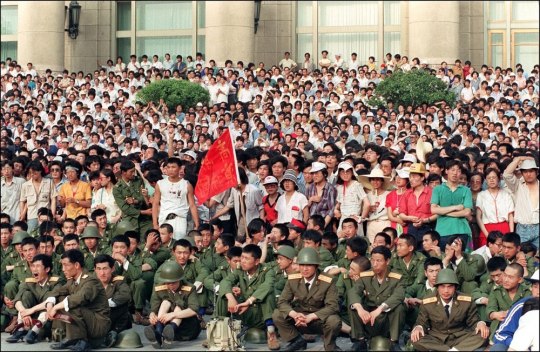

🇨🇳 Come scritto in questo lunghissimo, ma estremamente dettagliato Rapporto, dal titolo: "制止动乱和平息反革命暴乱的决议", più di 200 soldati e poliziotti Cinesi furono brutalmente assassinati nei giorni più caldi della rivoluzione colorata anti-CPC, molti dei quali disarmati 😡
➡️ Traduzione del Rapporto 🐰
🐰 Come potete vedere in queste foto, vi sono poliziotti e soldati Cinesi DISARMATI. Alcuni di loro dialogano con il pubblico. Sarebbe ottimo, come fa notare World Affairs, confrontare foto simili con il comportamento della Polizia in Francia o negli USA ❗️
📺 Vi è anche un video che mostra Soldati dell'Esercito Popolare di Liberazioni e manifestanti che cantano canzoni in una sorta di «amichevole duello», ciò mostra un clima molto diverso da quello propagandato in Occidente, e dimostra come sia il Partito Comunista Cinese sia i manifestanti non si aspettassero una gigantesca escalation di violenza, foraggiata e sostenuta dagli USA in funzione anti-CPC, tramite la CIA 🇺🇸
🌸 Iscriviti 👉 @collettivoshaoshan
🇨🇳 As written in this very long but extremely detailed Report, entitled: "制止动乱和平息反革命暴乱的决议", more than 200 Chinese soldiers and policemen were brutally assassinated in the hottest days of the anti-CPC color revolution, many of the which ones unarmed 😡
➡️ Translation of the Report 🐰
🐰 As you can see in these photos, there are DISARMED Chinese policemen and soldiers. Some of them talk to the public. It would be great, as World Affairs points out, to compare similar photos with the behaviour of the Police in France or the USA ❗️
📺 There is also a video showing People's Liberation Army soldiers and protesters singing songs in a sort of "friendly duel", this shows a very different climate from the one touted in the West, and demonstrates how both the Communist Party of China is protesters didn't expect a gigantic escalation of violence, sponsored and supported by the US in an anti-CPC function, via the CIA 🇺🇸
🌸 Subscribe 👉 @collettivoshaoshan
#socialism#china#italian#translated#communism#china news#collettivoshaoshan#marxism leninism#xi jinping#marxist leninist#marxismo#marxist#marxism#socialismo#socialist#deng xiaoping#deng#chinese communist party#people liberation army#asian history#chinese history#world history#history#western imperialism#american imperialism#color revolution
15 notes
·
View notes
Photo

(link)
4 notes
·
View notes
Text
2008: Comparing Qing Self-Strengthening Movement With PRC Reform and Opening
As yet another a Chinese regime — the People’s Republic of China again retrenches in the face of a hostile world and seeks to use both foreign and domestic technologies to defend itself against the encroachments of the West it can be interesting to make comparison to how a predecessor, the Da Qing (known today as the Qing Dynasty) responded to a similar challenge from the West and sought to…
View On WordPress
#China#Chinese#Cixi#Communist Party#crisis#deng xiaoping#艾青#詩人#Hundred Days Reform#Mao Zedong#politics#PRC#Qing#reform#reform and opening#self-strengthening#Self-Strengthening Movement#Yangwu Yungong#洋務運動#中国#溫家寶
0 notes
Text
youtube
Você sabia? O real motivo pelo qual a China foi de vilã para heroína nas produções hollywoodianas!
#chinese#china#007#the face of fu manchu#mao tse tung#christopher lee#sean connery#goldfinger#james bond#roger moore#you only live twice#the man with the golden gun#deng xiaoping#Akiko Wakabayashi#meg 2#jason statham#sharks#Li Bingbing#Shuya Sophia Cai#Wu Jing#Youtube
1 note
·
View note